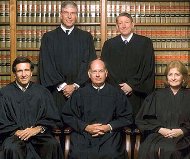Article from: www.thenewspaper.com/news/37/3799.asp
5/22/2012
Delaware Supreme Court Rules Against Traffic Stop Delays
Police may not unnecessarily detain motorist pulled over for speeding, the Delaware Supreme Court ruled.
 A police officer may not unreasonably delay a motorist pulled over for a traffic citation, the Delaware Supreme Court ruled last week. Many departments use minor infractions as an excuse to conduct an extensive search for possible evidence of more serious crimes. The justices ruled 4-1 against this practice.
A police officer may not unreasonably delay a motorist pulled over for a traffic citation, the Delaware Supreme Court ruled last week. Many departments use minor infractions as an excuse to conduct an extensive search for possible evidence of more serious crimes. The justices ruled 4-1 against this practice.
"An officer who pulls a car over for speeding does not thereby gain free rein to ask as many questions, for as long a time, as he might wish," Chief Justice Myron T. Steele wrote for the majority. "Further investigation requires further justification."
The decision considered the actions of Wilmington Detective Samuel Smith who was patrolling in an unmarked car one day at 30th Street and Jefferson Street. Smith saw a man -- Glen Murray -- look at him, then get in a Chrysler and drive off. Smith called in backup, Wilmington Police Officer Matthew Hazzard, who was able to stop Murray's car for allegedly speeding on Interstate 95.
Instead of a ticket, Murray was given a verbal reprimand. The officers then proceeded to interrogate him and his passengers solely for the purpose of finding drugs. Even though the officers admitted they had no reason to believe Murray was dangerous in any way, they ordered him out of the car so he could be frisked. The officers then searched a bookbag on the floor of the car for "anything illegal."
The high court has no problem with officers using speeding or other common tickets as a pretext to pull over a motorist, so long as the violation is a real one. Once the violation is handled, however, the traffic stop must end.
"The officer's power to detain the car evaporated after the officers ended the investigation that provided the objective justification for the stop," Steele wrote. "At that time, the officers had no authority to continue detaining the car, and, admittedly, no reason to suspect that Murray possessed contraband."
Ordering Murray out of the car constituted the first violation of the Fourth Amendment. Justice Henry duPont Ridgely disagreed with his colleagues and insisted the drugs found in the search of the bookbag were the fruit of a legitimate search because the police had obtained consent and the intrusion was minimal.
A copy of the decision is available in a 120k PDF file at the source link below.
Source: Murray v. Delaware (Supreme Court of Delaware, 5/14/2012)
Permanent Link for this item
Return to Front Page
 A police officer may not unreasonably delay a motorist pulled over for a traffic citation, the Delaware Supreme Court ruled last week. Many departments use minor infractions as an excuse to conduct an extensive search for possible evidence of more serious crimes. The justices ruled 4-1 against this practice.
A police officer may not unreasonably delay a motorist pulled over for a traffic citation, the Delaware Supreme Court ruled last week. Many departments use minor infractions as an excuse to conduct an extensive search for possible evidence of more serious crimes. The justices ruled 4-1 against this practice.